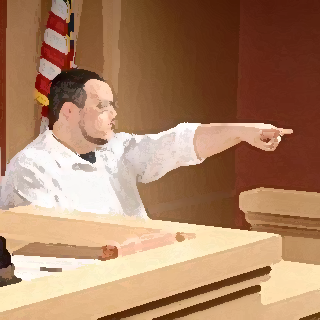Conspiracy is a Guaranteed Conviction in a Federal Court
Invented to persecute those opposing medieval kings, "Conspiracy" is being used to enforce politics through the so-called "Federal Court"
Vicarious Liability
The theory of vicarious liability, upon which conspiracy law depends provides that " Participants in a conspiracy become criminally responsible for the reasonably foreseeable acts of any co-conspirators committed during the Conspiracy and in furtherance of the Conspiracy. In the case of Pinkerton v. United States, 328 U.S. 640 (1946), the US Supreme Court ruled that all members of a conspiracy can be charged for crimes committed by their co- conspirators that are within the scope of the conspiracy and are a reasonably foreseeable consequences of the conspiracy. The benefit of this is that all reasonably foreseeable criminal acts committed by any of the co-conspirators, and reasonably related to the Conspiracy, can be introduced at trial. This is true even though those on trial may not have directly participated in the acts. In addition, statements made by co-conspirators during and in furtherance of a conspiracy are not considered to be hearsay, so can be used at trial against other members of the Conspiracy
The Courts know the Conspiracy falsity, but..
Federal Courts' Judges know very well that they are convicting innocent people under conspiracy laws, but they never mind doing so; of course while mentioning how unjust such conviction can be. Here are some views and some of what has been said on records by judges of various Federal Courts about "Conspiracy and Government use of Conspiracy Law":
Sayre, Criminal Conspiracy, 35 HARVARD LAW REVIEW 393, 393 (1922)("A doctrine so vague in its outlines and uncertain in its fundamental nature as criminal conspiracy lends no strength or glory to the law; it is a veritable quicksand of shifting opinion and ill-considered thought"); Hyde v. United States, 222 U.S. 347, 387 (1912)(Holmes, J, with Lurton, Hughes 7 Lamarr, JJ.)(dissenting)(�And as wherever two or more have united for the commission of a crime there is a conspiracy, the opening to oppression thus made is very wide indeed. It is even wider if success should be held not to merge the conspiracy in the crime intended and achieved�), both quoted in substantial part in Katyal, Conspiracy Theory, 112 YALE LAW JOURNAL 1307, 1310 n. 6 (2003).
Federal prosecutors have used, and been encouraged to use, the law available to them, Harrison v. United States, 7 F.2d 259, 263 (2d Cir. 1925)("[C]onspiracy, that darling of the modern prosecutor�s nursery�); United States v. Reynolds, 919 F.2d 435, 439 (7th Cir. 1990)("[P]rosecutors seem to have conspiracy on their word processors as Count I�); Chesney, Terrorism, Criminal Prosecution, and the Preventive Detention Debate, 50 SOUTH TEXAS LAW REVIEW 669, 684 (2009)(�What options do prosecutors have in the terrorism-prevention scenario when [other charges] are unavailable for lack of evidence linking the suspect to a designated foreign terrorist organization? One possibility is conspiracy liability�)
You will be convicted of a crime you did not commit, and regardless time, knowledge, or contribution
Conspiracy under Title 18, U.S.C. � 371 is the Overt Act. The Overt Act is some affirmative act done by one or more of the co- conspirators. The Overt Act, done in furtherance of the Agreement demonstrates that Agreement has advanced from merely talk to action. In other words, instead of simply talking about the crime, the conspirators have actually taken a step towards making it a reality. The Overt Act MUST come after the Agreement we have been talking about. Once the Overt Act occurs, the crime of Conspiracy is �complete� and can be charged under Title 18 U.S.C. � 371. It�s important to understand that the crime of Conspiracy does NOT merge with the substantive offense, so can be charged separately from the substantive offense.
In addition, the overt act that follows the agreement doesn�t necessarily have to be an illegal act. It just has to be some act that demonstrates that the agreement is now being acted upon.
Oppression and Snitches
Clearly, it is such an easy task for the government to make anyone a party to any alleged conspiracy, and with that reality in hand, this is how the Conspiracy Law is being used in the United States as tool of oppression to force people into submission to the will of the government, and for dismantling any possible cohesion among people. Here how that works; let's ask What if an individual deemed a part of an alleged Conspiracy wants out...can such an individual withdraw from the Conspiracy? The government says, YES, sure can ... but here's how
Just as the law recognizes that a person can join an on-going conspiracy, the law also recognizes that an individual may withdraw from a Conspiracy prior to its completion. Withdrawal from a Conspiracy requires more than simply no longer participating. To withdraw from a Conspiracy, there are two basic requirements: First: the person must do some affirmative act inconsistent with the goals of the Conspiracy. Unless the co-conspirator can demonstrate that he quit the Conspiracy, his or her participation in the Conspiracy is presumed to continue. Second: the co-conspirator must do some affirmative act that is reasonably calculated to communicate to a fellow co-conspirator, or law enforcement, that he has withdrawn from the Conspiracy.
Meaning, you are forced to tell the government about others, you will spy and snitch on others, just as it was in the Soviet Union; or else, you are part of a "Conspiracy."
The Politics of Conspiracy Law
Oppression, Money, and Total Submission are derivative of the government ill-use of the U.S. Conspiracy Law


